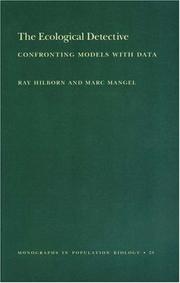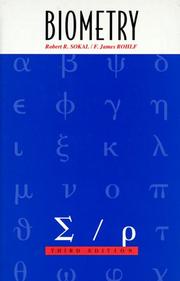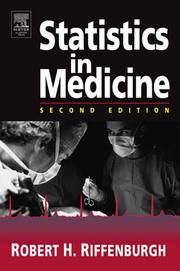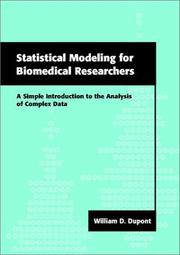| Listing 1 - 10 of 33 | << page >> |
Sort by
|
Book
ISBN: 9780521875806 0521875803 9780521699099 0521699096 9780511975820 9780511993121 0511993129 9780511989308 051198930X 0511975821 1107218802 051199432X 1282978349 9786612978340 0511992092 0511987528 0511991118 9781107218802 9781282978348 6612978341 9780511992094 9780511987526 9780511991110 Year: 2011 Publisher: Cambridge : Cambridge University Press,
Abstract | Keywords | Export | Availability | Bookmark
 Loading...
Loading...Choose an application
- Reference Manager
- EndNote
- RefWorks (Direct export to RefWorks)
This book is for anyone who has biomedical data and needs to identify variables that predict an outcome, for two-group outcomes such as tumor/not-tumor, survival/death, or response from treatment. Statistical learning machines are ideally suited to these types of prediction problems, especially if the variables being studied may not meet the assumptions of traditional techniques. Learning machines come from the world of probability and computer science but are not yet widely used in biomedical research. This introduction brings learning machine techniques to the biomedical world in an accessible way, explaining the underlying principles in nontechnical language and using extensive examples and figures. The authors connect these new methods to familiar techniques by showing how to use the learning machine models to generate smaller, more easily interpretable traditional models. Coverage includes single decision trees, multiple-tree techniques such as Random Forests™, neural nets, support vector machines, nearest neighbors and boosting.
Medical statistics --- Biometry --- Data Interpretation, Statistical --- Models, Statistical --- Data processing --- Medical statistics. --- Biometry. --- Biological statistics --- Biology --- Biometrics (Biology) --- Biostatistics --- Biomathematics --- Statistics --- Health --- Health statistics --- Medicine --- Statistical methods --- Data processing. --- Medical statistics - Data processing --- Biometry - Data processing
Book
ISSN: 21034605 ISBN: 2742012710 9782742012718 9782742007745 2742007741 Year: 2011 Volume: 5 Publisher: Montrouge, France
Abstract | Keywords | Export | Availability | Bookmark
 Loading...
Loading...Choose an application
- Reference Manager
- EndNote
- RefWorks (Direct export to RefWorks)
Biometry. --- Biology --- Tumors. --- Research. --- Neoplasms --- Tumours --- Biological research --- Biomedical research --- Biological statistics --- Biometrics (Biology) --- Biostatistics --- Statistical methods --- Pathology --- Cysts (Pathology) --- Oncology --- Biomathematics --- Statistics --- Biometry --- Research
Book
ISBN: 9783030696412 9783030696429 9783030696436 9783030696405 3030696405 303069643X 3030696413 Year: 2021 Publisher: Cham, Switzerland : Springer,
Abstract | Keywords | Export | Availability | Bookmark
 Loading...
Loading...Choose an application
- Reference Manager
- EndNote
- RefWorks (Direct export to RefWorks)
This richly illustrated book provides an overview of the design and analysis of experiments with a focus on non-clinical experiments in the life sciences, including animal research. It covers the most common aspects of experimental design such as handling multiple treatment factors and improving precision. In addition, it addresses experiments with large numbers of treatment factors and response surface methods for optimizing experimental conditions or biotechnological yields.The book emphasizes the estimation of effect sizes and the principled use of statistical arguments in the broader scientific context. It gradually transitions from classical analysis of variance to modern linear mixed models, and provides detailed information on power analysis and sample size determination, including ‘portable power’ formulas for making quick approximate calculations. In turn, detailed discussions of several real-life examples illustrate the complexities and aberrations that can arise in practice.Chiefly intended for students, teachers and researchers in the fields of experimental biology and biomedicine, the book is largely self-contained and starts with the necessary background on basic statistical concepts. The underlying ideas and necessary mathematics are gradually introduced in increasingly complex variants of a single example. Hasse diagrams serve as a powerful method for visualizing and comparing experimental designs and deriving appropriate models for their analysis. Manual calculations are provided for early examples, allowing the reader to follow the analyses in detail. More complex calculations rely on the statistical software R, but are easily transferable to other software.Though there are few prerequisites for effectively using the book, previous exposure to basic statistical ideas and the software R would be advisable.
Statistical science --- Biomathematics. Biometry. Biostatistics --- bio-informatica --- statistiek --- statistisch onderzoek --- Experimental design. --- Disseny d'experiments

ISBN: 0691034974 0691034966 9780691034973 1299133274 1400847311 9781400847310 9780691034966 Year: 1997 Volume: 28 Publisher: Princeton, N.J. Princeton University Press
Abstract | Keywords | Export | Availability | Bookmark
 Loading...
Loading...Choose an application
- Reference Manager
- EndNote
- RefWorks (Direct export to RefWorks)
The modern ecologist usually works in both the field and laboratory, uses statistics and computers, and often works with ecological concepts that are model-based, if not model-driven. How do we make the field and laboratory coherent? How do we link models and data? How do we use statistics to help experimentation? How do we integrate modeling and statistics? How do we confront multiple hypotheses with data and assign degrees of belief to different hypotheses? How do we deal with time series (in which data are linked from one measurement to the next) or put multiple sources of data into one inferential framework? These are the kinds of questions asked and answered by The Ecological Detective. Ray Hilborn and Marc Mangel investigate ecological data much as a detective would investigate a crime scene by trying different hypotheses until a coherent picture emerges. The book is not a set of pat statistical procedures but rather an approach. The Ecological Detective makes liberal use of computer programming for the generation of hypotheses, exploration of data, and the comparison of different models. The authors' attitude is one of exploration, both statistical and graphical. The background required is minimal, so that students with an undergraduate course in statistics and ecology can profitably add this work to their tool-kit for solving ecological problems.
Biomathematics. Biometry. Biostatistics --- General ecology and biosociology --- Ecology --- Mathematical models --- Issue --- Mathematical models. --- Ecology - Mathematical models --- MONOGRAPHS --- ECOLOGY --- MATHEMATICAL MODELS
Book
ISBN: 9780132065023 0132065029 Year: 2010 Publisher: Upper Saddle River Pearson Education International
Abstract | Keywords | Export | Availability | Bookmark
 Loading...
Loading...Choose an application
- Reference Manager
- EndNote
- RefWorks (Direct export to RefWorks)
Biomathematics. Biometry. Biostatistics --- Mathematical statistics --- Biometry --- Biométrie --- 519.2 --- 57.087.1 --- 519.2:57 --- binomiale verdeling --- biologie --- biometrie --- biostatistiek --- chi-kwadraattoetsen --- correlaties --- hypothesen testen --- lineaire regressie --- multipele regressie --- oefeningen --- oplossingen --- regressie-analyse --- variantieanalyse --- wiskunde --- Probability. Mathematical statistics --- Biometry. Statistical study and treatment of biological data --- Waarschijnlijkheidsrekening. Mathematische of wiskundige statistiek --- statistiek en biologie --- 57.087.1 Biometry. Statistical study and treatment of biological data --- 519.2 Probability. Mathematical statistics --- Biométrie

ISBN: 0716724111 9780716724117 Year: 1995 Publisher: San Francisco (Calif.): Freeman
Abstract | Keywords | Export | Availability | Bookmark
 Loading...
Loading...Choose an application
- Reference Manager
- EndNote
- RefWorks (Direct export to RefWorks)
Biometry. --- Biometry --- 519.2:57 --- 57.087.1 --- beschrijvende statistiek --- biologie --- biometrie --- biostatistiek --- chi-kwadraattoetsen --- hypothesen testen --- kansverdelingen --- lineaire regressie --- multipele regressie --- normale verdeling --- regressie-analyse --- statistiek --- variantieanalyse --- wiskunde --- #WDIR:wbse --- 519.2 --- 519.2 Probability. Mathematical statistics --- Probability. Mathematical statistics --- Biological statistics --- Biology --- Biometrics (Biology) --- Biostatistics --- Biomathematics --- Statistics --- 57.087.1 Biometry. Statistical study and treatment of biological data --- Biometry. Statistical study and treatment of biological data --- Anthropology, Physical --- Statistics as Topic --- statistiek en biologie --- Statistical methods --- Biomathematics. Biometry. Biostatistics --- Basic Sciences. Statistics --- Applied Statistics. --- Aetiology --- computer applications --- Data processing --- Biométrie --- Statistical analysis

ISBN: 0387239189 9780387239187 0387291504 Year: 2005 Publisher: New York, NY : Springer New York : Imprint: Springer,
Abstract | Keywords | Export | Availability | Bookmark
 Loading...
Loading...Choose an application
- Reference Manager
- EndNote
- RefWorks (Direct export to RefWorks)
This greatly expanded second edition of Survival Analysis- A Self-learning Text provides a highly readable description of state-of-the-art methods of analysis of survival/event-history data. This text is suitable for researchers and statisticians working in the medical and other life sciences as well as statisticians in academia who teach introductory and second-level courses on survival analysis. The second edition continues to use the unique "lecture-book" format of the first (1996) edition with the addition of three new chapters on advanced topics: Chapter 7: Parametric Models Chapter 8: Recurrent events Chapter 9: Competing Risks. Also, the Computer Appendix has been revised to provide step-by-step instructions for using the computer packages STATA (Version 7.0), SAS (Version 8.2), and SPSS (version 11.5) to carry out the procedures presented in the main text. The original six chapters have been modified slightly to expand and clarify aspects of survival analysis in response to suggestions by students, colleagues and reviewers, and to add theoretical background, particularly regarding the formulation of the (partial) likelihood functions for proportional hazards, stratified, and extended Cox regression models David Kleinbaum is Professor of Epidemiology at the Rollins School of Public Health at Emory University, Atlanta, Georgia. Dr. Kleinbaum is internationally known for innovative textbooks and teaching on epidemiological methods, multiple linear regression, logistic regression, and survival analysis. He has provided extensive worldwide short-course training in over 150 short courses on statistical and epidemiological methods. He is also the author of ActivEpi (2002), an interactive computer-based instructional text on fundamentals of epidemiology, which has been used in a variety of educational environments including distance learning. Mitchel Klein is Research Assistant Professor with a joint appointment in the Department of Environmental and Occupational Health (EOH) and the Department of Epidemiology, also at the Rollins School of Public Health at Emory University. Dr. Klein is also co-author with Dr. Kleinbaum of the second edition of Logistic Regression- A Self-Learning Text (2002). He has regularly taught epidemiologic methods courses at Emory to graduate students in public health and in clinical medicine. He is responsible for the epidemiologic methods training of physicians enrolled in Emory’s Master of Science in Clinical Research Program, and has collaborated with Dr. Kleinbaum both nationally and internationally in teaching several short courses on various topics in epidemiologic methods.
Mathematical statistics --- Biomathematics. Biometry. Biostatistics --- Survival analysis (Biometry) --- Survival Analysis --- Programmed Instruction --- Distribution (Probability theory. --- Statistics. --- Epidemiology. --- Mathematical statistics. --- Probability Theory and Stochastic Processes. --- Statistics for Life Sciences, Medicine, Health Sciences. --- Statistical Theory and Methods. --- Mathematics --- Statistical inference --- Statistics, Mathematical --- Statistics --- Probabilities --- Sampling (Statistics) --- Diseases --- Public health --- Statistical analysis --- Statistical data --- Statistical methods --- Statistical science --- Econometrics --- Distribution functions --- Frequency distribution --- Characteristic functions --- 610.72 --- Analysis, Survival (Biometry) --- Survivorship analysis (Biometry) --- Biometry --- Failure time data analysis --- Survival Analysis. --- Programmed Instructions as Topic. --- Probabilities. --- Statistics . --- Probability --- Combinations --- Chance --- Least squares --- Risk
Book
ISBN: 331931243X 3319312456 9783319312439 Year: 2016 Publisher: Cham : Springer International Publishing : Imprint: Springer,
Abstract | Keywords | Export | Availability | Bookmark
 Loading...
Loading...Choose an application
- Reference Manager
- EndNote
- RefWorks (Direct export to RefWorks)
Applied Survival Analysis Using R covers the main principles of survival analysis, gives examples of how it is applied, and teaches how to put those principles to use to analyze data using R as a vehicle. Survival data, where the primary outcome is time to a specific event, arise in many areas of biomedical research, including clinical trials, epidemiological studies, and studies of animals. Many survival methods are extensions of techniques used in linear regression and categorical data, while other aspects of this field are unique to survival data. This text employs numerous actual examples to illustrate survival curve estimation, comparison of survivals of different groups, proper accounting for censoring and truncation, model variable selection, and residual analysis. Because explaining survival analysis requires more advanced mathematics than many other statistical topics, this book is organized with basic concepts and most frequently used procedures covered in earlier chapters, with more advanced topics near the end and in the appendices. A background in basic linear regression and categorical data analysis, as well as a basic knowledge of calculus and the R system, will help the reader to fully appreciate the information presented. Examples are simple and straightforward while still illustrating key points, shedding light on the application of survival analysis in a way that is useful for graduate students, researchers, and practitioners in biostatistics. Clearly illustrates concepts of survival analysis principles and analyzes actual survival data using R, in addition to including an appendix with a basic introduction to R Organized via basic concepts and most frequently used procedures, with advanced topics toward the end of the book and in appendices Includes multiple original data sets that have not appeared in other textbooks Dirk F. Moore is Associate Professor of Biostatistics at the Rutgers School of Public Health and the Rutgers Cancer Institute of New Jersey. He received a Ph.D. in biostatistics from the University of Washington in Seattle and, prior to joining Rutgers, was a faculty member in the Statistics Department at Temple University. He has published numerous papers on the theory and application of survival analysis and other biostatistics methods to clinical trials and epidemiology studies.
Statistics. --- Epidemiology. --- Biostatistics. --- Statistics for Life Sciences, Medicine, Health Sciences. --- Statistical Theory and Methods. --- Survival analysis (Biometry) --- Failure time data analysis. --- Analysis, Failure time data --- Data analysis, Failure time --- Analysis, Survival (Biometry) --- Survivorship analysis (Biometry) --- Biometry --- Failure time data analysis --- Failure analysis (Engineering) --- Mathematical statistics --- Competing risks --- Statistical methods. --- Mathematical statistics. --- Diseases --- Public health --- Mathematics --- Statistical inference --- Statistics, Mathematical --- Statistics --- Probabilities --- Sampling (Statistics) --- Statistical analysis --- Statistical data --- Statistical methods --- Statistical science --- Econometrics --- Statistics . --- Biological statistics --- Biology --- Biometrics (Biology) --- Biostatistics --- Biomathematics --- R (Computer program language). --- GNU-S (Computer program language) --- Domain-specific programming languages --- Analyse de la survie (Biométrie) --- Temps entre défaillances, Analyse des

ISBN: 9780120887705 0120887703 9786613267429 128326742X 0080541747 9780080541747 9780444501981 0444501983 0444501991 9780444501998 6613267422 0080505864 9780080505879 0080505872 Year: 2006 Publisher: Amsterdam ; Boston : Elsevier Academic Press,
Abstract | Keywords | Export | Availability | Bookmark
 Loading...
Loading...Choose an application
- Reference Manager
- EndNote
- RefWorks (Direct export to RefWorks)
Medicine deals with treatments that work often but not always, so treatment success must be based on probability. Statistical methods lift medical research from the anecdotal to measured levels of probability. This book presents the common statistical methods used in 90% of medical research, along with the underlying basics, in two parts: a textbook section for use by students in health care training programs, e.g., medical schools or residency training, and a reference section for use by practicing clinicians in reading medical literature and performing their own research. The book does no
Biometry --- Models, Statistical. --- Medical statistics. --- Statistique médicale --- methods. --- Medical statistics --- Statistics as Topic --- Models, Statistical --- methods --- Statistique médicale --- ELSEVIER-B EPUB-LIV-FT --- Health --- Health statistics --- Medicine --- Statistics --- Statistical methods --- Chromatographic analysis --- Analysis, Chromatographic --- Chromatography --- Analytical chemistry --- Phase partition --- Chromatographic analysis. --- Biometry - methods

ISBN: 0521655781 0521820618 9780521820615 9780521655781 0511061749 9780511061745 0511055412 9780511055416 0511070209 9780511070204 0511121164 9780511121166 9781139146098 1139146092 0511323859 9780511323850 1280162554 9781280162558 9786610162550 6610162557 Year: 2002 Publisher: Cambridge : Cambridge University Press,
Abstract | Keywords | Export | Availability | Bookmark
 Loading...
Loading...Choose an application
- Reference Manager
- EndNote
- RefWorks (Direct export to RefWorks)
This text will enable biomedical researchers to use several advanced statistical methods that have proven valuable in medical research. The emphasis is on understanding the assumptions underlying each method, using exploratory techniques to determine the most appropriate method, and presenting results in a way that will be readily understood.
Models, Statistical --- Empirical Research --- Medicine --- Research --- Statistical methods --- Mathematical models --- Mathematical models. --- Biomathematics. Biometry. Biostatistics --- Médecine --- Recherche --- Méthodes statistiques --- Modèles mathématiques --- Clinical sciences --- Medical profession --- Research&delete& --- Statistical methods&delete& --- Health Workforce --- Methodology. --- Statistical methods. --- WA 18.2 Public Health - Educational materials --- Biometry --- Mathematical Computing --- Problems and Exercises [PT] --- Data Interpretation, Statistical --- Medicine - Research - Statistical methods - Mathematical models
| Listing 1 - 10 of 33 | << page >> |
Sort by
|

 Search
Search Feedback
Feedback About
About Help
Help News
News